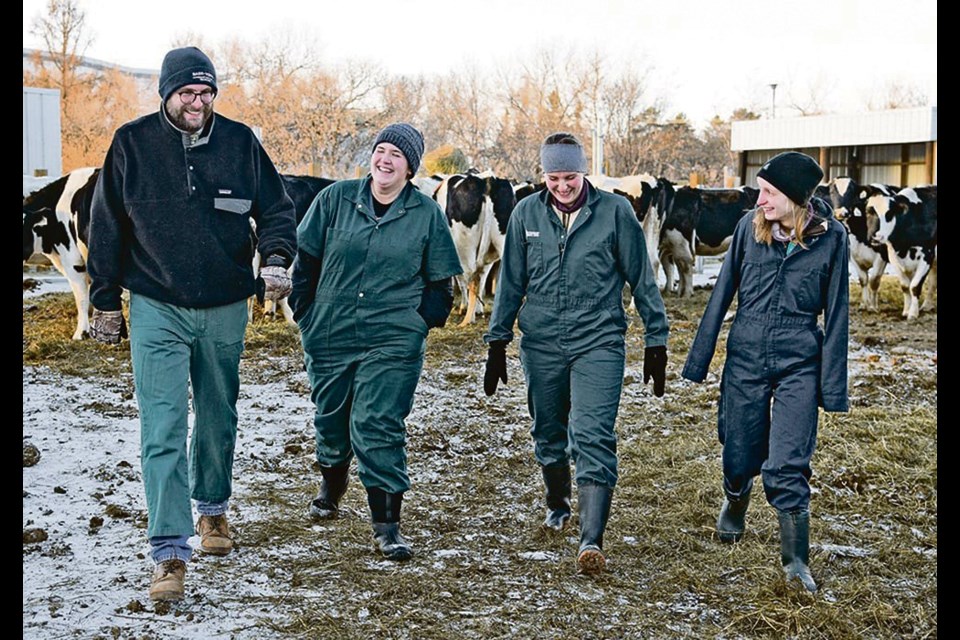SASKATOON — Chris Clark has told the story more than once.
The associate dean at the Western College of Veterinary Medicine in Saskatoon frequently spoke to the media in the early 2000s, when BSE was a national issue in Canada.
One day, a reporter from the West Coast called him, wanting to check facts about Canada’s beef industry.
“Her questions were: is it true that most of the calves born in B.C. go to feedlots in Alberta?” said Clark, during a phone interview from his office at the University of Saskatchewan.
Clark told the reporter, yes, most of the calves from British Columbia farms likely go to Alberta feedlots.
She then asked what age they go to the feedlot. He said: usually nine to 15 months.
Then she asked a question that Clark has not forgotten: ‘What age are they when they come back (to the farm in B.C.)?’ That was the person who was trying to write the story on BSE. I always use that (story) as the example of why you should engage,” Clark said.
“The person working in the general media may know nothing about agriculture… and they get the wrong end of the stick because they know nothing about it.”
Clark is one of the university scientists and Agriculture Canada researchers who routinely attend public meetings and regularly speak to the media about agriculture.
Their voices are important because the public does want to hear from food and agriculture experts.
In 2020, the . Part of the report found that Canadians have a high level of trust in farmers and university scientists. Farmers ranked first and scientists were a close second.
“(Often) people come to me with questions because they don’t know enough and it’s something I know something about,” Clark said. “In that vacuum, where there’s a lack of information, any information that is at least factual is really, really valuable.”
One recent example is ivermectin.
Last summer, some Canadians started buying ivermectin, a livestock dewormer, to use as a treatment for COVID-19. Clark took many, many media calls about the drug and explained why humans should not take it.
“You’ll notice on the label that it says do not use in humans. And it says that for very good reason,” he told the CBC in September. “And I know it seems impossible to have to say this, but you need to trust what it says on that label more than what some guy said on Twitter or Facebook.”
Clark did get pushback for his comments.
“I don’t have much of a social media presence…. I got a bunch of phone calls from people who wanted to argue with me,” he said.
“I’ve got a fairly thick skin… you have to be prepared that there’s always going to be someone that disagrees with you.”
Angry feedback intimidates some scientists, who avoid public controversies. If a researcher says glyphosate is safe or that cattle provide environmental benefits, Twitter trolls will react.
They will label the scientist as an industry shill who is corrupt or worse.
Some scientists may not like playing defence, where they must stand up for the status quo in agriculture.
But that’s not their role, said Tim McAllister, a researcher in ruminant nutrition and microbiology with Agriculture Canada in Lethbridge.
“It’s not our job to defend it. It’s our job to state the facts,” he said, adding publicly funded scientists have an obligation to share their knowledge and findings with the public.
“A big part of what we’re trying to do … is give the public information so (people) can make informed decisions.”
If agricultural scientists don’t participate in the public arena, there is a risk that extremists can take over the debate.
In December, Time magazine published a piece with the headline: “Cows are the new coal.”
And last winter, the Guardian wrote an article claiming that livestock are destroying nature and a plant-based diet is the best way to save wildlife.
Clark said scientists can help clear up some of the misinformation.
“I would like to see more informed scientists engaging in the debate,” said Clark.
“It would be good to hear more voices with expertise speaking out on these topics. I really would. They do have stuff that adds to the conversation.”
McAllister is doing his bit.
Last summer, he and Kim Stanford, a University of Lethbridge scientist, started . They interview fellow scientists and seek answers to questions like: are cows wasting human food or eating human waste? And how much do cattle contribute to climate change?
But such outreach is not about defending cattle or how meat is produced in Canada.
“I always present it as trade-offs. There’s no one optimal solution…. If people want to consume organic produce or organic meat… people need to be aware of the trade-offs associated with organic vs. conventional production,” he said.
“Ultimately, it gets back to the consumers making their own choice. The best we can hope for is that they’re making that choice from an informed a position as possible.”




